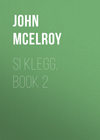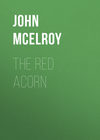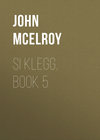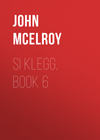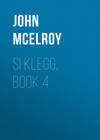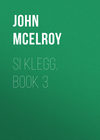Czytaj książkę: «Si Klegg, Book 1», strona 2
CHAPTER IV. THE AWFUL HARDTACK
THE HARD AND SOLID STAFF OF MILITARY LIFE
"APPETITE'S a queer thing," said Si to Shorty one day, when both were in a philosophical mood. "It's an awful bother when you haven't it, and it's a great deal worse when you have it, and can't get anything for it." "Same as money," returned sage Shorty. During the first few months of Si Klegg's service in the army the one thing that bothered him more than anything else was his appetite. It was a very robust, healthy one that Si had, for he had grown up on his father's farm in Indiana, and had never known what it was to be hungry without abundant means at hand for appeasing his desires in that direction. His mother's cupboard was never known to be in the condition of Old Mother Hubbard's, described in the nursery rhyme. The Kleggs might not have much tapestry and bric-a-brac in their home, but their smoke-house was always full, and Mrs. Klegg's kitchen could have fed a camp-meeting any time without warning. So it was that when Si enlisted his full, rosy face and his roundness of limb showed that he had been well fed, and that nature had made good use of the ample daily supplies that were provided. His digestive organs were kept in perfect condition by constant exercise.
After Si had put down his name on the roll of Co. Q of the 200th Ind. he had but a few days to remain at home before his regiment was to start for Louisville. During this time his mother and sisters kept him filled up with "goodies" of every sort. In fact, it was the biggest thing in the way of a protracted picnic that Si had ever struck.
"You must enjoy these things while you can, Si," said his mother, "for goodness knows what you'll do when you really git into the army. I've heerd 'em tell awful things about how the poor sogers don't have half enough to eat, and what they do git goes agin' any Christian stomach. Here, take another piece of this pie. A little while, and it'll be a long time, I reckon, till ye git any more."
"Don't keer if I do!" said Si, for there was scarcely any limit to his capacity.
And so during those days and nights the old lady and the girls cooked and cooked, and Si ate and ate, until it seemed as if he wouldn't want any more till the war was over.
Si was full, and as soon as Co. Q was, it was ordered to camp, and Si had to go. They loaded him down with good things enough to last him a week. The pretty Annabel—the neighbor's daughter who had solemnly promised Si that she wouldn't go with any other fellow while he was away—came around to see Si off and brought him a rich fruit cake.
"I made that for you," she said.
"Bully for you!" said Si, for he felt that he must begin to talk like a soldier.
The first day or two after reaching Louisville the 200th received rations of "soft bread." But that didn't last long. It was only a way they had of letting the fresh soldier down easy. Orders came to get ready to pull out after Bragg, and then Si'a regiment had its first issue of army rations. As the Orderly pried open a box of hardtack and began to distribute them to the boys, exclaimed:
"Them's nice-looking soda crackers. I don't believe the grub is going to be so bad, after all."
Si had never seen a hardtack before.
"Better taste one and see how you like it!" said one of Buell's ragged Indiana veterans, who had come over to see the boys of the 200th and hear the latest news from "God's country."
It happened that this lot was one of extra quality as to hardness. The baker's watch had stopped, or he had gone to sleep, and they had been left in the oven or dry-kiln too long. Si took one of them and carried it to his mouth. He first tried on it the bite which made such havoc with a quarter section of custard pie, but his incisors made no more impression upon it than if it had been a shingle.
"You have to bear on hard," said the veteran, with a grim smile.
"Je-ru-sa-lem!" exclaimed Si after he had made two or three attempts equally barren of results.
Then he tried his "back teeth." His molars were in prime order, and his jaw power was sufficient to crack a hickory nut every time. Si crowded one corner of the hardtack as far as he could between his "grinders," where he could get a good "purchase" on it, shut his eyes and turned on a full head of steam. His teeth and jaws fairly cracked under the strain, but he couldn't even "phase" it.
"If that ain't old pizen!" said Si. "It beats anything I ever seen up in the Wabash country."
But his blood was up, and laying the cracker upon a log, he brought the butt of his gun down upon it like a pile-driver.
"I thought I'd fix ye," he said, as he picked up the fragments, and tried his teeth upon the smaller ones. "Have I got to eat such stuff as that?" with a despairing look at his veteran friend. "I'd just as soon be a billy-goat and live on circus-posters, fruit-cans and old hoop-skirts."
"You'll get used to it after a while, same's we did. You'll see the time when you'll be mighty glad to get even as hard a tack as that!"
Si's heart sank almost into his shoes at the prospect, for the taste of his mother's pie and Annabel's fruit cake were yet fresh in his mouth. But Si was fully bent on being a loyal, obedient soldier, determined to make the best of everything without any more "kicking" than was the inalienable right of every man who wore a uniform.
For the first time in his life Si went to bed hungry that night. Impelled by the gnawings of his appetite he made repeated assaults upon the hardtack, but the result was wholly insufficient to satisfy the longings of his stomach. His supper wasn't anything to speak of. Before going to bed he began to exercise his ingenuity on various schemes to reduce the hardtack to a condition in which it would be more gratifying to his taste and better suited to the means with which nature had provided him for disposing of his rations. Naturally Si thought that soaking in water would have a beneficial effect. So he laid five or six of them in the bottom of a camp-kettle, anchored them down with a stone, and covered them with water. He thought that with the aid of a frying-pan he would get up a breakfast that he could eat, anyway.
Si felt a little blue as he lay curled up under his blanket with his head pillowed on his knapsack. He thought some about his mother, and sister Maria, and pretty Annabel, but he thought a good deal more about the beef and potatoes, the pies and the puddings, that were so plentifully spread upon the table at home.
It was a long time before he got to sleep. As he lay there, thinking and thinking, there came to his mind some ether uses to which it seemed to him the hardtack might be put, which would be much more consistent with its nature than to palm it off on the soldiers as alleged food. He thought he could now understand why, when he enlisted, they examined his teeth so carefully, as if they were going to buy him for a mule. They said it was necessary to have good teeth in order to bite "cartridges" successfully, but now he knew it was with reference to his ability to eat hardtack.
Si didn't want to be killed if he could help it.
While he was lying there he determined to line one of his shirts with hardtacks, and he would put that on whenever there was going to be a fight. He didn't believe the bullets would go through them. He wanted to do all he could toward paralyzing the rebels, and with such a protection he could be very brave, while his comrades were being mowed down around him. The idea of having such' a shirt struck Si as being a brilliant one.
Then, he thought hardtack would be excellent for half-soling his shoes. He didn't think they would ever wear out.
If he ran short of ammunition he could ram pieces of hardtack into his gun and he had no doubt they would do terrible execution in the ranks of the enemy.
All these things and many more Si thought of until finally he was lost in sleep. Then he dreamed that somebody was trying to cram stones down his throat.
The company was called out at daylight, and immediately after roll-call Si went to look after the hardtacks he had put to soak the night before. He thought he had never felt so hungry in his life. He fished out the hardtack and carefully inspected them, to note the result of the submerging and to figure out the chances on his much-needed breakfast.
To any old soldier it would be unnecessary to describe the condition in which Si found those hardtacks, and the effect of the soaking. For the information of any who never soaked a hardtack it may be said that Si found them transformed, to all appearances, into sole-leather. They were flexible, but as tough as the hide that was "found in the vat when the tanner died."
Si tried to bite a piece off one of them to see what it was like, but he couldn't get his teeth through it. In sheer desperation he laid it on a log, seized a hatchet, and chopped off a corner. He put it in his mouth and chewed on it a while, but found it as tasteless as cold codfish.
Si thought he would try the frying-pan. He chopped the hardtacks into bits, put in equal parts of water and grease, sifted over the mixture a little salt and pepper, and then gave it a thorough frying. Si's spirits rose during the gradual development of this scheme, as it seemed to offer a good prospect for his morning meal. And when it came to the eating. Si found it really good, comparatively speaking, even though it was very much like a dish compounded of the sweepings from around a shoemaker's bench. A good appetite was indispensable to a real enjoyment of this—which the soldiers called by a name that cannot be given here—but Si had the appetite, and he ate and was thankful.
"I thought I'd get the bulge on them things some way or other," said Si, as he drank the last of his coffee and arose from his meal, feeling like a giant refreshed with new wine.
For the next two or three months Si largely devoted his surplus energies to further experimenting with the hardtack. He applied every conceivable process of cookery he could think of that was possible with the meager outfit at his command in the way of utensils and materials. Nearly all of his patient and persevering efforts resulted only in vexation of spirit.
He continued to eat hardtack from day to day, in these various forms, but it was only because he had to do it. He didn't hanker after it, but it was a military necessity—hardtack or starvation. It was a hard choice, but Si's love of life—and Annabel—induced him to choose the hardtack.
But for a long-time Si's stomach was in a state of chronic rebellion, and on the whole he had a hard time of it getting used to this staple article of army diet. He did not become reconciled to it until after his regiment had rations of flour for a week, when the "cracker-line" had been cut by the guerillas and the supply of that substantial edible was exhausted. Si's experience with the flour swept away all his objections to the hardtack. Those slapjacks, so fearfully and wonderfully made, and those lumps of dough, mixed with cold water and dried on flat stones before the fire, as hard as cannon balls, played sad havoc with his internal arrangements. For the first time he was obliged to fall into the cadaverous squad at sick-call and wabble up to the doctor's shop, where he was dosed with castor-oil and blue-mass. Si was glad enough to see hardtack again. Most of the grumbling he did thereafter concerning the hardtack was because he often couldn't get enough.
About six months taught Si what all the soldiers learned by experience, that the best way to eat the average hardtack was to take it "straight"—just as it came out of the box, without any soaking or frying or stewing. At meal-time he would make a quart or so of coffee, stab the end of a ramrod through three or four slices of sowbelly, and cook them over the coals, allowing some of the drippings to fall upon the hardtack for lubricating purposes, and these constituted his frugal repast.
CHAPTER V. FAT PORK—INDISPENSABLE BODY TIMBER FOR PATRIOTISM
IT WAS told in the last chapter how the patriotic impulses of Si Klegg, of the 200th Ind., reached his stomach and digestive apparatus, and brought them under obedient subjection to hardtack. He didn't have quite so rough an experience with that other staple of army diet, which was in fact the very counterpart of the hardtack, and which took its most popular name from that part of the body of the female swine which is usually nearest the ground. Much of Si's muscle and brawn was due to the fact that meat was always plenty on his father's farm. When Si enlisted he was not entirely free from anxiety on the question of meat, for to his appetite it was not even second in importance to bread. If bread was the "staff of life" meat was life itself to Si. It didn't make much difference to him what kind it was, only so it was meat. He didn't suppose Uncle Sam would keep him supplied with quail on toast and porterhouse steaks all the time, but he did hope he would give him as much as he wanted of something in that line.
"You won't get much pork, unless you're a good forager," said one of Si's friends he met at Louisville, and who had been a year in the service.
Si thought he might, with practice and a little encouragement, be fairly successful in foraging on his' own hook, but at the same time he said he wouldn't grumble if he could only get plenty of pork. Fortunately for him he had not been imbued with the teachings of the Hebraic dispensation which declared "unclean" the beast that furnished the great bulk of the animal food for the American defenders of the Union.
Co. Q of the 200th Ind. received with the first issue of army rations at Louisville a bountiful supply of bacon of prime quality, and Si was happy at the prospect. He thought it would always be that way.
"I don't see anything the matter with such grub as that!" said Si. "Looks to me as though we were goin' to live like fighting-cocks."
"You're just a little bit brash," said his veteran friend, who had just been through the long, hungry march from Huntsville, Ala., to Louisville. "Better eat all you can lay yer hands on now, while ye've got a chance. One o' these days ye'll git into a tight place and ye won't see enough hog's meat in a week to grease a griddle. I've bin there, myself! Jest look at me and see what short rations 'll bring you to?"
But Si thought he wouldn't try to cross a bridge till he got to it, nor lie awake nights worrying over troubles that were yet in the future. Si had a philosophical streak in his mental make-up and this, by the way, was a good thing for a soldier to have. "Sufficient unto the day is the evil thereof," was an excellent rule for him to go by.
So Si assimilated all the pork that fell to his share, with an extra bit now and then from a comrade whose appetite was less vigorous. He thrived under its fructifying influence, and gave good promise of military activity and usefulness. No scientific processes of cookery were necessary to prepare it for immediate use. A simple boiling or frying or toasting was all that was required.
During the few days at Louisville fresh beef was issued occasionally. It is true that the animals slain for the soldiers were not always fat and tender, nor did each of them have four hind-quarters. This last fact was the direct cause of a good deal of inflammation in the 200th Ind., as in every other regiment. The boys who got sections of the forward part of the "critter," usually about three-quarters bone, invariably kicked, and fired peppery remarks at those who got the juicy steaks from the rear portion of the animal. Then when their turn came for a piece of hind-quarter the other fellows would growl. Four-fifths of the boys generally had to content themselves with a skinny rib or a soupshank. Si shared the common lot, and did his full quota of grumbling because his "turn" for a slice of steak didn't come every time beef was issued.
The pickled pork was comparatively free from this cause of irritation. It was all alike, and was simply "Hobson's choice." Si remembered the fragrant and delicious fried ham that so often garnished his mother's breakfast table and wondered why there was not the same proportion of hams and sides in the Commissary that he remembered in the meathouse on the Wabash. He remarked to Shorty one day:
"I wonder where all this pork comes from?"
"It comes from Illinoy, I suppose," said Shorty. "I notice the barrels are all marked 'Chicago'."
"Must grow funny kind o' hogs out there—a mile long each, I should say. What do you mean?"
"Why, we've drawn a full mile o' sides from the Commissary, and haint struck a ham yit. I'm wonderin' jest how long that hog is!"
"Well, you are green. You oughter know by this time that there are only enough hams for the officers."
Now and then a few pigs' shoulders were handed round among the boys, but the large proportion of bone they contained was exasperating, and was the cause of much profanity.
Sometimes bacon was issued that had really outlived its usefulness, except, perhaps, for the manufacture of soap. Improperly "cured," it was strong and rancid, or, occasionally, so near a condition of putrefaction that the stench from it offended the nostrils of the whole camp. Some times it was full of "skippers," that tunneled their way through and through it, and grew fat with riotous living.
Si drew the line at this point. He had an ironplated stomach, but putrid and maggoty meat was too much for it. Whenever he got any of this he would trade it off to the darkies for chickens. There is nothing like pork for a Southern negro. He wants something that will "stick to his ribs."
By a gradual process of development his appetite reached the point when he could eat his fat pork perfectly raw. During a brief halt when on the march he would squat in a fence corner, go down into his haversack for supplies, cut a slice of bacon, lay it on a hardtack, and munch them with a keen relish.
At one of the meetings of the Army of the Cumberland Gen. Garfield told a story which may appropriately close this chapter.
One day, while the Army of the Cumberland was beleaguered in Chattanooga and the men were almost starving on quarter rations, Gen. Rosecrans and his staff rode out to inspect the lines. As the brilliant cavalcade dashed by a lank, grizzled soldier growled to a comrade:
"It'd be a darned sight better for this army if we had a little more sowbelly and not quite so many brass buttons!"
CHAPTER VI. DETAILED AS COOK—SI FINDS RICE ANOTHER INNOCENT
WITH A GREAT DEAL OF CUSSEDNESS IN IT
IT WOULD have been very strange, indeed, if Si Klegg had not grumbled loudly and frequently about the food that was dished up to him by the company cooks. In the first place, it was as natural for a boy to grumble at the "grub" as it was for him to try to shirk battalion drill or "run the guard." In the next place, the cooking done by the company bean-boiler deserved all the abuse it received, for as a rule the boys who sought places in the hash foundry did so because they were too lazy to drill or do guard duty, and their knowledge of cooking was about like that of the Irishman's of music:
"Can you play the fiddle, Pat?" he was asked. "Oi don't know, sor-r-r—Oi niver tried."
Si's mother, like most of the well-to-do farmers' wives in Indiana, was undoubtedly a good cook, and she trained up her daughters to do honor to her teachings, so that Si undoubtedly knew what properly-prepared food was. From the time he was big enough to spank he had fared sumptuously every day. In the gush of patriotic emotions that prompted him to enlist he scarcely thought of this feature of the case. If it entered his mind at all, he felt that he could safely trust all to the goodness of so beneficent a Government as that for the preservation of which he had offered himself as a target for the rebels to shoot at. He thought it no more than fair to the brave soldiers that Uncle Sam should furnish professional cooks for each company, who would serve everything up in the style of a first-class city restaurant. So, after Si got down among the boys and found how it really was, it was not long till his inside was a volcano of rebellion that threatened serious results.
When, therefore, Si lifted up his voice and cried aloud, and spared not—when he said that he could get as good coffee as that furnished him by dipping his cup into a tan-vat; when he said that the meat was not good soap-grease, and that the potatoes and beans had not so much taste and nutrition in them as so much pine-shavings, he was probably nearer right than grumblers usually are.
"Give it to 'em, Si," his comrades would Say, when he turned up his loud bazoo on the rations question. "They ought to get it ten times worse. When we come out we expected that some of us would get shot by the rebels, but we didn't calculate that we were going to be poisoned in camp by a lot of dirty, lazy potwrastlers."
One morning after roll-call the Orderly-Sergeant came up to Si and said:
"There's been so much chin-music about this cooking-business that the Captain's ordered the cooks to go back to duty, and after this everybody'll have to take his regular turn at cooking. It'll be your turn to-day, and you'll stay in camp and get dinner."
When Co. Q marched out for the forenoon drill. Si pulled off his blouse and set down on a convenient log to think out how he should go to work. Up to this time he had been quite certain that he knew all about cooking that it was worth while to know. Just now none of his knowledge seemed to be in usable shape, and the more he thought about it the less able he seemed to be to decide upon any way of beginning. It had always appeared very easy for his mother and sisters to get dinner, and on more than one occasion he had reminded them how much better times they had staying in the house cooking dinner than he had out in the harvest field keeping up with the reaper. At this moment he would rather have kept up with the fastest reaper in Posey County, on the hottest of July days, than to have cooked the coarse dinner which his 75 comrades expected to be ready for them when they returned, tired, hot and hungry, from the morning drill.
He went back to the barracks and inspected the company larder. He found there the same old, coarse, greasy, strong, fat pork, a bushel or so of beans, a few withered potatoes, sugar, coffee, bread, and a box of rice which had been collected from the daily rations because none of the cooks knew how to manage it. The sight of the South Carolina staple recalled the delightful rice puddings his mother used to make. His heart grew buoyant.
"Here's just the thing," he said. "I always was fond of rice, and I know the boys will be delighted with it for a change. I know I can cook it; for all that you've got to do is to put it in a pot with water and boil it till it is done. I've seen mother do that lots o' times.
"Let's see," he said, pursuing his ruminations.
"I think each boy can eat about a cupful, so I'll put one for each of 'em in the kettle."
"There's one for Abner," he continued, pouring a cupful in for the first name on the company-roll; "one for Acklin, one for Adams, one for Barber, one for Brooks," and so on down through the whole well-known list.
"It fills the old kettle tol'bly full," he remarked, as he scanned the utensil after depositing the contribution for Williams, the last name on the roll; "but I guess she'll stand it. I've heard mother tell the girls that they must always keep the rice covered with water, and stir it well, so that it wouldn't burn; so here goes. Won't the boys be astonished when they have a nice mess of rice, as a change from that rusty old side-meat!"
He hung the kettle on the fire and stepped out to the edge of the parade-ground to watch the boys drilling. It was the first time he had had the sensation of pleasure of seeing them at this without taking part in it himself, and he began to think that he would not mind if he had to cook most of the time. He suddenly remembered about his rice and hurried back to find it boiling, bulging over the top like a small snowdrift.
"I was afraid that kettle was a little too full," he said to himself, hurrying off for another campkettle, in which he put about a third of the contents of the first. "Now they're all right. And it'll cook better and quicker in two than one. Great Scott! what's the matter? They're both boiling over. There must be something wrong with that rice."
Pretty soon he had all the company kettles employed, and then all that he could borrow from the other companies. But dip out as much as he would there seemed no abatement in the upheaving of the snowy cereal, and the kettles continued to foam over like so many huge glasses of soda water. He rushed to his bunk and got his gum blanket and heaped upon it a pile as big as a small haycock, but the mass in the kettle seemed larger than it was before this was subtracted.
He sweat and dipped, and dipped and sweat; burned his hands into blisters with the hot rice and hotter kettles, kicked over one of the largest kettles in one of his spasmodic rushes to save a portion of the food that was boiling over, and sent its white contents streaming over the ground. His misery came to a climax as he heard the quick step of his hungry comrades returning from drill.
"Right face; Arms a-port; Break ranks—March!" commanded the Orderly-Sergeant, and there was a clatter of tin cups and plates as they came rushing toward him to get their dinner—something to stay their ravenous stomachs. There was a clamor of rage, ridicule, wrath and disappointment as they took in the scene.
"What's the matter here?" demanded the Captain, striding back to the company fire. "You young rascal, is this the way you get dinner for your comrades? Is this the way you attend to the duty for which you're detailed? Waste rations in some fool experiment and scatter good food all over the ground? Biler, put on your arms and take Klegg to the guard-houae. I'll make you pay for this nonsense, sir, in a way that you won't forget in a hurry, I'll be bound."
So poor Si marched to the guard-house, where he had to stay for 24 hours, as a punishment for not knowing, until he found out by this experience, that rice would "s-well." The Captain wouldn't let him have anything to eat except that scorched and half-cooked stuff cut of the kettles, and Si thought he never wanted to see any more rice as long as he lived.
In the evening one of the boys took Si's blanket to him, thinking he would want it to sleep in.
"I tell ye, pard, this is purty derned tough!" said Si as he wiped a tear out of the southwest corner of his left eye with the sleeve of his blouse. "I think the Cap'n's hard on a feller who didn't mean to do nothin' wrong!" And Si looked as if he had lost all his interest in the old flag, and didn't care a pinch of his burnt rice what became of the Union.
His comrade "allowed" that it was hard, but supposed they, had got to get used to such things. He said he heard the Captain say he would let Si out the next day.












